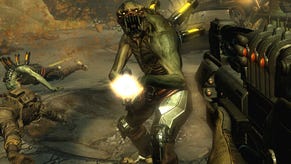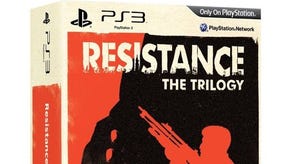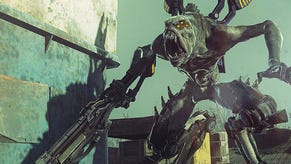Resistance 2
Hands-on with the multiplayer modes.
There's certainly more blood spurting about than there was in Resistance 1, not to mention the chopping off of heads, arms and legs, and enemies exploding into pieces. "We decided to up the level of gore mostly because it was fun," says Price. "It was a very selfish decision on our part. We wanted to get more enjoyment out of killing the Chimera in creative ways, and some of the weapons we've introduced allow us to do that."
Hands-on, it's clear the more unusual weapons do add to the competitive multiplayer experience, as do the Berserks. You can switch them both out between respawns, and it's fun to experiment with different combinations. We were told there were "about 50" players in our battle, so we didn't see the game running at maximum capacity. However, there were only a couple of instances of slowdown during a good 20 minutes of play. And Price is right about the squads effectively spreading players over the map, so you're not endlessly running into each other.
For the most part, however, it's business as usual when it comes to the competitive multiplayer mode. The online co-op mode is much more intriguing - partly because it's for up to eight players, and partly because there wasn't any such mode in the first Resistance game.
Price admits that was because they simply didn't have the time, stating, "Online co-op was just something that was beyond what we could do. Our goal this time was not only to do it, but to take it well beyond what people would expect."
Jake Biegel, lead designer on the co-op mode, is even more bullish. "We are convinced we're revolutionising online co-op," he says. "When we sat down to work on Resistance 2, we wanted to do something different. We didn't just want to throw two people in the single-player campaign. We wanted to offer a whole other universe of content - a whole other game."
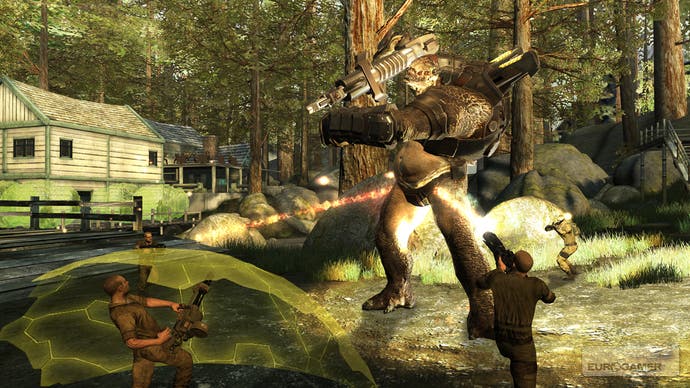
The plan, Biegel continues, was to "push the limits of what people have done with consoles in the past", which is where the eight-player policy came in. "With eight players together, it has very much the feel of a raid or something like that. So we're definitely blurring the line of PC gaming with online console gaming."
According to Biegel, Team Fortress 2 was a big influence - as was, less predictably, World of Warcraft. "What you find to find to be addictive in games like those, we touch on a lot of that flavour," he says. "A lot of that sensibility has never been brought to the first-person environment before, so we're pushing the limits of what we can do."
But what if you don't have seven friends? Is Resistance 2's co-op mode still fun for two players? "Absolutely," says Biegel. "The co-op mode scales, so the amount of enemies you see, the health of the bosses will diminish when you're playing in smaller groups. We've done a lot of testing with two players, and it becomes much more strategic. There's not as much room for error."
It's not just the maximum number of players that has been upped - Biegel reckons you can expect to see up to a hundred enemies on-screen at a time. "I think we're pretty much the only guys out there who can push that many on-screen, in-frame, but yeah. It's not like every single encounter has that, or it would get boring and there would be no pacing, but we definitely get encounters where we're approaching a hundred enemies."
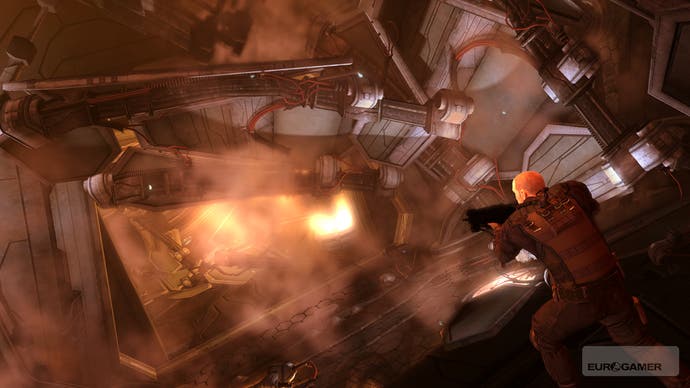
With so many enemies and indeed players running about, the whole thing could well get chaotic - which is where the character class system comes in. You can choose to be a soldier, medic or special ops man (in charge of distributing ammo and shields), and experiment with different character ratios for your squads. "Classes are very important. We wanted to get people to work together organically and force them to depend on each other," says Biegel.
"There's no other shooter I've played where you're instantly forced to be in a group. I just end up doing my own thing, being a hero and showing how good I am - but you can't do that in co-op. You only have a moment to be the hero, which is dependent on your class."
As you play you acquire something called 'grey tech'; reward points, essentially, that can be used to upgrade your armour and weapons. They're transferable across classes - "So if you played for 160 hours as a soldier and you want to start again as a medic, you can use the currency you've built up to power up your medic," Biegel confirms.


